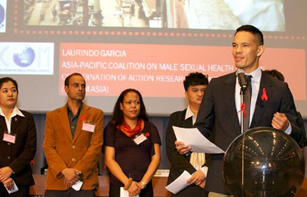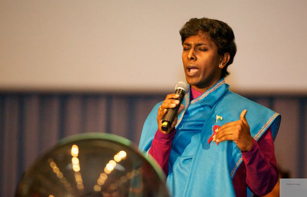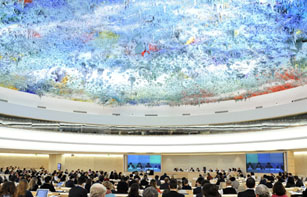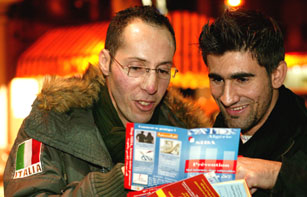
Representatives from the community of people living with HIV and key populations most at risk urge governments in Asia and the Pacific to work with them to reach global AIDS targets and commitments.
Credit: UN ESCAP
Dressed in a striking blue and red shalwar kameez (traditional dress from South and Central Asia), Akkai, a transgender woman from Bangladesh, steps onto the stage. Turning to her audience of government officials from Ministries of health, justice, public security, drug control, social protection; United Nations officials; and fellow members of key populations most affected by HIV, she started to sing:
“I born as me/ My feelings changed… / I started behaving like a girl / I started walking like a girl / I started dressing as a girl / When my parents forced me to stop myself / I was beaten up / I was locked up / I was tortured…./ …There was nobody to ask these things / … / This kind of torture, violence, harassment / Is not faced only by me / Where to live?/ Where to share?/ Where to survive our life?”
Joining the scene, the coordinator of the Women’s arm of the Asia-Pacific Network of people living with HIV explained: “I have been living with HIV for 17 years. Fortunately I have had access to treatment. But now free-trade agreements are compromising access to essential medicines,” she said. “Eighty percent of generic medicines are made in this region. Without access to affordable medicines we cannot get to zero,” she added.
These personal experiences were two of many shared by people living with HIV and key affected populations at the United Nations Economic and Social Commission for Asia and the Pacific (UN ESCAP) high-level intergovernmental meeting held in Bangkok, Thailand from 6-8 February 2012. The meeting was an opportunity to review the region’s progress towards international targets on AIDS.
For the first time in history we have the possibility to end AIDS and Asia-Pacific nations have shown we can lead the world in making an impact. But we cannot ignore the challenges our region faces and how these can jeopardize our ability to progress
H.E. Ratu Epeli Nailatikau, President of Fiji
“For the first time in history we have the possibility to end AIDS and Asia-Pacific nations have shown we can lead the world in making an impact. But we cannot ignore the challenges our region faces and how these can jeopardize our ability to progress,” H.E. Ratu Epeli Nailatikau, President of Fiji, who underlined his long-term commitment and leadership on HIV as Chair of the high-level talks.
Representatives from the most-affected communities urged government delegations from Asia-Pacific nations to recognize the existing challenges in accessing HIV services posed by punitive laws and practices, threats to continued availability of HIV treatment and widespread stigma and discrimination. They also called upon governments to work increasingly with communities to ramp-up action to reach HIV goals.
The call to action was heard. By the end of the three-day talks, co-convened by UNAIDS and other UN partners, the nations present endorsed a framework to fast-track regional action on AIDS towards the achievement of global targets and commitments by 2015. Countries agreed to create ‘spaces’ for key affected communities—including people who use drugs, men who have sex with men, people who buy and sell sex, and transgender people—to be involved in the development of practical solutions to legal impediments and HIV service scale-up at the policy and programmatic level.
“It was recognized here that we have to find new ways to reach the maximum amount of people in the short time we have before 2015,” said UNAIDS Director of the Asia-Pacific Regional Support Team, Steven Kraus. “And there is no question; this must be done hand-in-hand with the community.”

Akkai, a transgender woman from Bangladesh, sings about the stigma and discrimination she faces.
Credit: UN ESCAP
In recent years, Asia and the Pacific has experienced significant progress in reduction of new HIV infections, increase on numbers of people receiving antiretroviral treatment and expansion of programmes to reach key populations most at risk.
Examples given by a number of countries at the Bangkok talks illustrated that scaled up HIV services coupled with intensive engagement of key affected populations, have led to declining epidemics. In Thailand for example, the transgender people-led initiative “Sisters”, which provides social services and support to transgender people in the Pattaya area reports that HIV incidence fell from 12 to 8% among people using its services in the last 5 years.
With such examples of progress, the importance of developing the next generation of community leaders is a central regional priority. The new Asia-Pacific framework for accelerated action underlines that young people from key affected populations must be heard, heeded, and have space at the policy and programme tables.
Emphasizing the readiness of young people most affected by HIV to take on a leadership role in the region’s future HIV response, Coordinator of Youth LEAD, the regional network for young HIV key affected populations, Thaw Zin Aye said: “Young people are taking ownership of the AIDS response and we are committed to carrying on the legacy. We urge governments to continue taking action with us.”
The endorsed regional framework emphasizes the need to share good practices and lessons learned in implementing the measures and commitments related to HIV. Asia-Pacific countries also requested UN ESCAP, UNAIDS and other cosponsors to support implementation of the road map.











